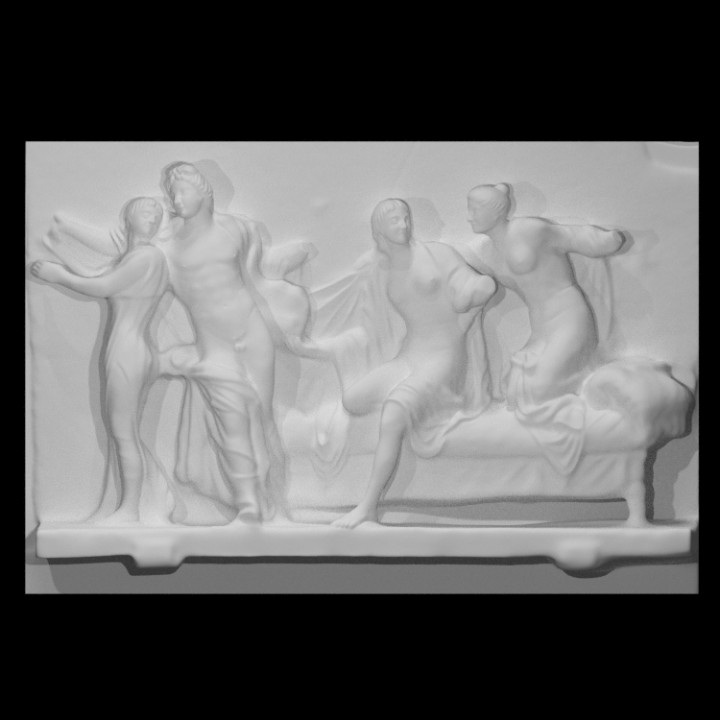
Alcibiades in the house of the Hetairai
myminifactory
Human: This marble relief panel portrays Alcibiades, a renowned Greek orator, statesman, and general, who was raised under Pericles of Athens' roof, and a devoted pupil and close friend of Socrates. He tirelessly attempted to instill in him an appreciation for the world of philosophy. Plutarch, writing much later, recounts how Alcibiades frequently surrendered himself to pleasure and often visited courtesans (hetairai) in the process. The relief is a part of a highly acclaimed exhibition in Gabinetto Segreto. The Secret Museum or Cabinet of Naples is an extensive collection of erotic art discovered in Pompeii and Herculaneum, carefully displayed in separate galleries within the National Archaeological Museum in Naples, Italy. This former Museo Borbonico features "cabinet" as a reference to a well-curated cabinet of curiosities, showcasing a selection of intriguing objects for admiration and study. Throughout ancient Pompeii and Herculaneum, numerous erotic frescoes, depictions of the god Priapus, explicit symbols, and inscriptions were unearthed, alongside household items such as phallic oil lamps. The Ancient Roman perspective on sexuality viewed explicit material distinctly differently from most present-day cultures. Ideas about obscenity evolved significantly over time, eventually developing into a modern concept of pornography. Initially, the excavation of Pompeii was an Enlightenment project; however, once artefacts were categorised using a new method of taxonomy, those deemed unsuitable for public viewing were classified as pornography and locked away in the Secret Museum in 1821. The doorway was sealed in 1849. At Pompeii, metal cabinets were erected over erotic frescoes, which could be viewed by gentlemen for an additional fee but remained inaccessible to ladies. This peep show continued to operate at Pompeii even into the 1960s. Access to the cabinet was limited to "people of mature age and respected morals," essentially educated men. The catalogue of the secret museum served as a form of censorship, downplaying the content of the room through engravings and descriptive texts. The excavation of Pompeii held significant importance for various influential groups with conflicting interests, each seeking validation for their own views on history while excluding anything that did not align with their preferred narrative. In the 1930s, Benito Mussolini, the Fascist dictator, viewed the excavations as evidence supporting the continuity of a Nova Roma. However, the presence of sexually explicit material posed a challenge to his vision. The secret room underwent multiple closures and reopenings over nearly a century before being briefly made accessible again at the end of the 1960s and finally re-opened in 2000. Since 2005, the collection has been housed in a separate room within the Naples National Archaeological Museum.
With this file you will be able to print Alcibiades in the house of the Hetairai with your 3D printer. Click on the button and save the file on your computer to work, edit or customize your design. You can also find more 3D designs for printers on Alcibiades in the house of the Hetairai.
